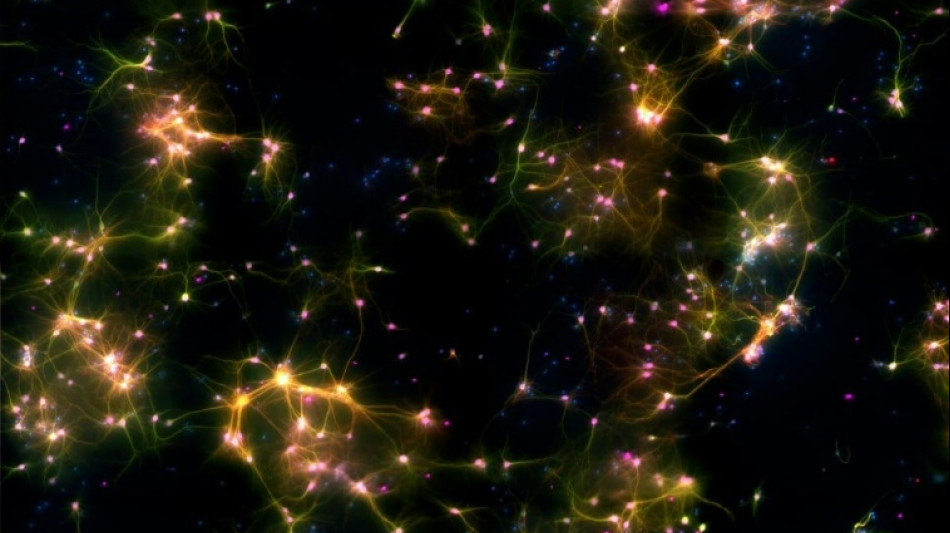
-
 Trail goes cold in UK abandoned babies mystery
Trail goes cold in UK abandoned babies mystery
-
Japan's Takaichi set to call February snap election: media

-
 Scientist wins 'Environment Nobel' for shedding light on hidden fungal networks
Scientist wins 'Environment Nobel' for shedding light on hidden fungal networks
-
From bricklayer to record-breaker: Brentford's Thiago eyes World Cup berth

-
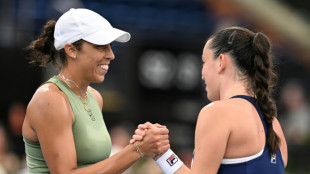 Keys overcomes serve demons to win latest Australian Open warm-up
Keys overcomes serve demons to win latest Australian Open warm-up
-
As world burns, India's Amitav Ghosh writes for the future
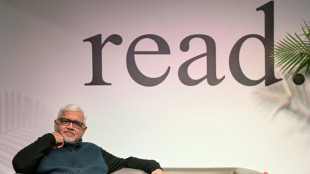
-
 Actor Kiefer Sutherland arrested for assaulting ride-share driver
Actor Kiefer Sutherland arrested for assaulting ride-share driver
-
Gilgeous-Alexander shines as Thunder halt Spurs losing streak

-
 West Bank Bedouin community driven out by Israeli settler violence
West Bank Bedouin community driven out by Israeli settler violence
-
Asian markets mixed, Tokyo up on election speculation

-
 US official says Venezuela freeing Americans in 'important step'
US official says Venezuela freeing Americans in 'important step'
-
2025 was third hottest year on record: EU, US experts

-
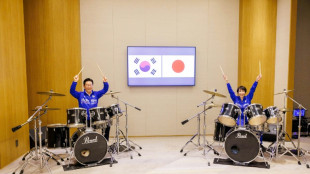 Japan, South Korea leaders drum up viral moment with K-pop jam
Japan, South Korea leaders drum up viral moment with K-pop jam
-
LA28 organizers promise 'affordable' Olympics tickets

-
 K-pop heartthrobs BTS to kick off world tour in April
K-pop heartthrobs BTS to kick off world tour in April
-
Danish foreign minister heads to White House for high-stakes Greenland talks

-
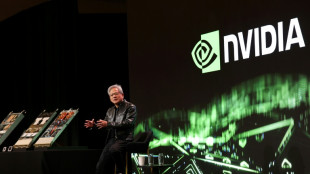 US allows Nvidia to send advanced AI chips to China with restrictions
US allows Nvidia to send advanced AI chips to China with restrictions
-
Sinner in way as Alcaraz targets career Grand Slam in Australia

-
 Rahm, Dechambeau, Smith snub PGA Tour offer to stay with LIV
Rahm, Dechambeau, Smith snub PGA Tour offer to stay with LIV
-
K-pop heartthrobs BTS to begin world tour from April

-
 Boeing annual orders top Airbus for first time since 2018
Boeing annual orders top Airbus for first time since 2018
-
US to take three-quarter stake in Armenia corridor

-
 Semenyo an instant hit as Man City close on League Cup final
Semenyo an instant hit as Man City close on League Cup final
-
Trump warns of 'very strong action' if Iran hangs protesters

-
 Marseille put nine past sixth-tier Bayeux in French Cup
Marseille put nine past sixth-tier Bayeux in French Cup
-
US stocks retreat from records as oil prices jump

-
 Dortmund outclass Bremen to tighten grip on second spot
Dortmund outclass Bremen to tighten grip on second spot
-
Shiffrin reasserts slalom domination ahead of Olympics with Flachau win
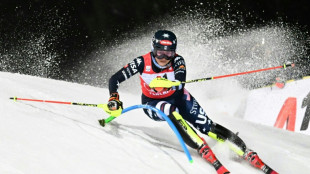
-
 Fear vies with sorrow at funeral for Venezuelan political prisoner
Fear vies with sorrow at funeral for Venezuelan political prisoner
-
Pittsburgh Steelers coach Tomlin resigns after 19 years: club

-
 Russell eager to face Scotland team-mates when Bath play Edinburgh
Russell eager to face Scotland team-mates when Bath play Edinburgh
-
Undav scores again as Stuttgart sink Frankfurt to go third

-
 Fuming French farmers camp out in Paris despite government pledges
Fuming French farmers camp out in Paris despite government pledges
-
Man Utd appoint Carrick as manager to end of the season

-
 Russia strikes power plant, kills four in Ukraine barrage
Russia strikes power plant, kills four in Ukraine barrage
-
France's Le Pen says had 'no sense' of any offence as appeal trial opens

-
 JPMorgan Chase reports mixed results as Dimon defends Fed chief
JPMorgan Chase reports mixed results as Dimon defends Fed chief
-
Vingegaard targets first Giro while thirsting for third Tour title

-
 US pushes forward trade enclave over Armenia
US pushes forward trade enclave over Armenia
-
Alpine release reserve driver Doohan ahead of F1 season

-
 Toulouse's Ntamack out of crunch Champions Cup match against Sale
Toulouse's Ntamack out of crunch Champions Cup match against Sale
-
US takes aim at Muslim Brotherhood in Arab world

-
 Gloucester sign Springbok World Cup-winner Kleyn
Gloucester sign Springbok World Cup-winner Kleyn
-
Trump tells Iranians 'help on its way' as crackdown toll soars

-
 Iran threatens death penalty for 'rioters' as concern grows for protester
Iran threatens death penalty for 'rioters' as concern grows for protester
-
US ends protection for Somalis amid escalating migrant crackdown

-
 Oil prices surge following Trump's Iran tariff threat
Oil prices surge following Trump's Iran tariff threat
-
Fashion student, bodybuilder, footballer: the victims of Iran's crackdown

-
 Trump tells Iranians to 'keep protesting', says 'help on its way'
Trump tells Iranians to 'keep protesting', says 'help on its way'
-
Italian Olympians 'insulted' by torch relay snub


'Sentient' brain cells in dish learn to play video game: study
Brain cells living in a dish can learn to play the classic video game Pong, thus demonstrating "intelligent and sentient behavior," Australian neuroscientists argue in a new paper.
Brett Kagan, who led the study published Wednesday in the journal Neuron, told AFP his findings open the door to a new type of research in which neurons could one day be used as biological information processors, complementing digital computers.
"What machines can't do is learn things very quickly -- if you need a machine learning algorithm to learn something, it requires thousands of data samples," he explained.
"But if you ask a human, or train a dog, a dog can learn a trick in two or three tries."
Neurons are the building blocks of intelligence in all animals, from flies to humans.
Kagan, the chief scientific officer at Melbourne-based Cortical labs, set out to answer the question of whether there is a way to harness neurons' inherent intelligence.
To perform their experiment, Kagan and colleagues took mice cells from embryonic brains, and derived human neurons from adult stem cells.
They then grew them on top of microelectrode arrays that could read their activity and stimulate them. The experiments involved a cluster of around 800,000 neurons, roughly the size of a bumblebee brain.
In the "game," a signal was sent from the left or right of the array to indicate where the ball was located, and "DishBrain," as the researchers called it, fired back signals to move the paddle, in a simplified, opponent-free version of Pong.
- 'Sentient, but not conscious' -
One of the major hurdles was figuring out how to "teach" the neurons.
In the past, it has been proposed to give them a shot of the "feel good" hormone dopamine to reward a correct action -- but that was very difficult to achieve in practice in a time-sensitive way.
Instead, the team relied on a theory called the "free energy principle" that was coined by the paper's senior author Karl Friston more than a decade ago, which says cells are hardwired to minimize unpredictability in their environments.
When the neurons succeeded in making the paddle hit the ball, they received a "predictable" electrical signal corresponding to success. But when they missed, they were sent a randomized, or "unpredictable" electrical signal.
"The only thing that the neurons could do is actually get better at trying to hit the ball to keep their world controllable and predictable," said Kagan.
The team believes DishBrain is sentient -- which they defined as being able to sense and respond to sensory information in a dynamic way -- but drew the line at calling it "conscious," which implies awareness of being.
DishBrain even tried out another task -- the dinosaur game that appears in Google Chrome when no internet connection is found, and the preliminary results were encouraging, said Kagan.
For their next steps, the team plans to test how DishBrain's intelligence is affected by medicines and alcohol -- though Kagan himself is most excited by the future possibilities of biological computers based on this foundational discovery.
"This is robustly conducted, interesting neuroscience," said Tara Spires-Jones of the Centre for Discovery Brain Science at the University of Edinburgh, who was not involved in the study.
"Don't worry, while these dishes of neurons can change their responses based on stimulation, they are not SciFi style intelligence in a dish, these are simple (albeit interesting and scientifically important) circuit responses," she added.
C.AbuSway--SF-PST




